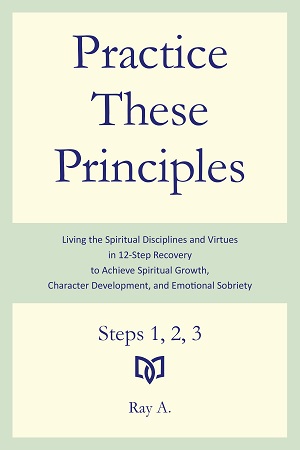
"For the believer then, no less than for the ex-believer, the agnostic or the atheist, religion can become a stumbling block to Step 2. Some will find in it a reason to disbelieve, others a faith that doesn’t work.
Consequently, in working this Step, the Big Book and the 12&12 guide us in making an honest self-examination of our attitudes in this area. Such a survey most often reveals that if religion has become a barrier to God, we have built the wall with the brick and mortar of our own attitudes and character defects. Pride, prejudice, self-righteousness and intolerance have been our chief building blocks.
Other times we will find that religion was not a barrier but a detour that diverted us from a right relationship with God and neighbor. Yet the same character defects obtained, whether directed at our co-religionists, at those of others denominations or faiths, or at unbelievers. Religion and lack of religion both could be used to diminish others and avoid looking at ourselves. In this dishonesty and pride worked hand in hand.
AA is quick to reassure the newcomer who has a problem with religion that we are a spiritual and not a religious program. In part, this is a tactical response. Our own negative experiences and prejudices aside, the reality is that religion has become problematic in the culture. This is the result of its own shortcomings as well as the relentless drive by secularist forces to marginalize religious faith. We want to get around this problem and help people get down to the business of AA. This business is to work the Steps and practice the principles of the program. It is a spiritual business, and it involves God directly, one on One.
That we practice a spiritual rather than a religious program is no evasion. It is one of the basic tenets of AA. For those who are hostile to religion, this is a distinction without a difference. They see spirituality as a thinly disguised attempt to bring religion in through the back door. Their problem is not with religion but with God, or, to put it differently, with theistic faith. The shortcomings of religion make it easier for them to deny faith and reject God.
Many of the traditionally religious object to spirituality on diametrically opposite grounds. They see spirituality as a vague and elastic term that can be stretched to mean everything and nothing. It allows people to waffle on the question of God, to wallow in a comfortable agnosticism, or to dabble in Gnosticism and syncretism, even the occult. They point out that spiritual powers can be good or evil. Satan, after all, is a spirit.
All this says, however, is that spirituality as originally understood in AA can be distorted, just as religion can. Indeed, the tendency to distortion is inherent in the very fact that, in its modern context, spirituality arises in reaction to a negative perception of religion. Taken to an extreme, as we alcoholics tend to take things, religion is summarily condemned and we willfully deny the good that it has accomplished throughout the centuries, even in its organized form. We want a spirituality that is free of all of its traces. In practice this leads some of us to a spirituality that is also free of God. . . .
Three aspects of organized religion as traditionally understood may account for its negative perception among many. First, as an institution, religion claims the power of mediation and interjects itself between God and man. In so doing it displaces the centrality of a direct relationship with the divine, spirit to Spirit, and erects walls of its own. Second, reflecting men’s passions, religious institutions throughout history have repeatedly assumed unwarranted secular powers and become more concerned with worldly than with godly affairs, with the tragic results familiar to all.
Third, organized forms of religion have tended to lose sight of the right relationship between their constituent parts. Central to most religions is a set of beliefs that is often formalized in creeds, a code of moral conduct usually expressed in injunctions and exhortations, and a pattern of worship often manifested in diverse liturgical traditions or practices. When creeds supersede deeds, when beliefs and rituals have no bearing on the way we actually live our lives on a daily basis, religion is reduced to that caricature of itself which elicits charges of hypocrisy and rightly earns the scorn of many. And which produces the man or woman who is filled with faith, yet “still reeking of alcohol.” . . .
This is the message of Step 2. What makes us sober and restores us to sanity is not religion. It is God. We are restored to sanity by “a living Creator with whom we may form a relationship upon simple and understandable terms as soon as we are willing and honest enough to try.”55 Those terms are laid out in the Steps. Through the spiritual principles in them we are led to a faith that works because it allows God’s power to enter us, expel the drinking obsession, and make us whole."
– From "Religion, Spirituality, and Faith," pp. 125–126, 128–129, 131
For more PTP123 Excerpts, please click on link.